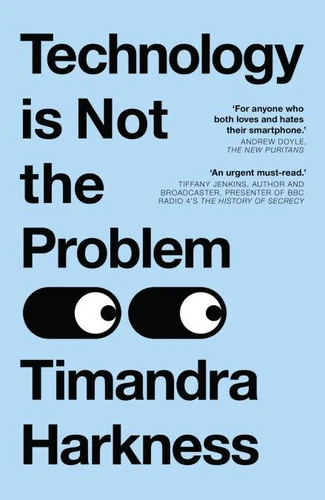Technology is Not the Problem
Par :Formats :
Disponible dans votre compte client Decitre ou Furet du Nord dès validation de votre commande. Le format ePub protégé est :
- Compatible avec une lecture sur My Vivlio (smartphone, tablette, ordinateur)
- Compatible avec une lecture sur liseuses Vivlio
- Pour les liseuses autres que Vivlio, vous devez utiliser le logiciel Adobe Digital Edition. Non compatible avec la lecture sur les liseuses Kindle, Remarkable et Sony
- Non compatible avec un achat hors France métropolitaine
 , qui est-ce ?
, qui est-ce ?Notre partenaire de plateforme de lecture numérique où vous retrouverez l'ensemble de vos ebooks gratuitement
Pour en savoir plus sur nos ebooks, consultez notre aide en ligne ici
- Nombre de pages320
- FormatePub
- ISBN978-0-00-849462-9
- EAN9780008494629
- Date de parution23/05/2024
- Protection num.Adobe DRM
- Infos supplémentairesepub
- ÉditeurHQ
Résumé
We already know how much of our data is collected and used to profile and target us.
The real question is why, knowing all this, do we keep going back for more?
'Great book' - Matt Ridley, author of How Innovation Works
'Essential reading' - Pete Etchells, author of Unlocked
'An urgent must-read' - Tiffany Jenkins, author and broadcaster, presenter of BBC Radio 4's A History of Secrecy
'Enticing and highly addictive' - Stephen Senn, statistician and author of Dicing with Death
'A pleasure to read' - Stian Westlake, Executive Chair, Economic and Social Research Council
Technology has delivered a world that we expect to revolve around us, our needs and preferences, and our unique personalities.
We willingly hand over intimate information about ourselves in return for a world that's easier to navigate. We live in the Personalised Century, where we view ourselves in terms of what rather than who we are - the objects of others' recognition, rather than the subjects and authors of our own lives. Is this a sign of our shrinking sense of self? Interrogating the historical currents that have brought us here, Harkness envisages a messier, riskier and less comfortable world than the one into which we're sliding.
Challenging readers to look at what's missing from their personalised menus, Technology is not the Problem encourages us to look afresh at the familiar: not just the technology we use every day, how we relate to the world and those around us.
We willingly hand over intimate information about ourselves in return for a world that's easier to navigate. We live in the Personalised Century, where we view ourselves in terms of what rather than who we are - the objects of others' recognition, rather than the subjects and authors of our own lives. Is this a sign of our shrinking sense of self? Interrogating the historical currents that have brought us here, Harkness envisages a messier, riskier and less comfortable world than the one into which we're sliding.
Challenging readers to look at what's missing from their personalised menus, Technology is not the Problem encourages us to look afresh at the familiar: not just the technology we use every day, how we relate to the world and those around us.
We already know how much of our data is collected and used to profile and target us.
The real question is why, knowing all this, do we keep going back for more?
'Great book' - Matt Ridley, author of How Innovation Works
'Essential reading' - Pete Etchells, author of Unlocked
'An urgent must-read' - Tiffany Jenkins, author and broadcaster, presenter of BBC Radio 4's A History of Secrecy
'Enticing and highly addictive' - Stephen Senn, statistician and author of Dicing with Death
'A pleasure to read' - Stian Westlake, Executive Chair, Economic and Social Research Council
Technology has delivered a world that we expect to revolve around us, our needs and preferences, and our unique personalities.
We willingly hand over intimate information about ourselves in return for a world that's easier to navigate. We live in the Personalised Century, where we view ourselves in terms of what rather than who we are - the objects of others' recognition, rather than the subjects and authors of our own lives. Is this a sign of our shrinking sense of self? Interrogating the historical currents that have brought us here, Harkness envisages a messier, riskier and less comfortable world than the one into which we're sliding.
Challenging readers to look at what's missing from their personalised menus, Technology is not the Problem encourages us to look afresh at the familiar: not just the technology we use every day, how we relate to the world and those around us.
We willingly hand over intimate information about ourselves in return for a world that's easier to navigate. We live in the Personalised Century, where we view ourselves in terms of what rather than who we are - the objects of others' recognition, rather than the subjects and authors of our own lives. Is this a sign of our shrinking sense of self? Interrogating the historical currents that have brought us here, Harkness envisages a messier, riskier and less comfortable world than the one into which we're sliding.
Challenging readers to look at what's missing from their personalised menus, Technology is not the Problem encourages us to look afresh at the familiar: not just the technology we use every day, how we relate to the world and those around us.



